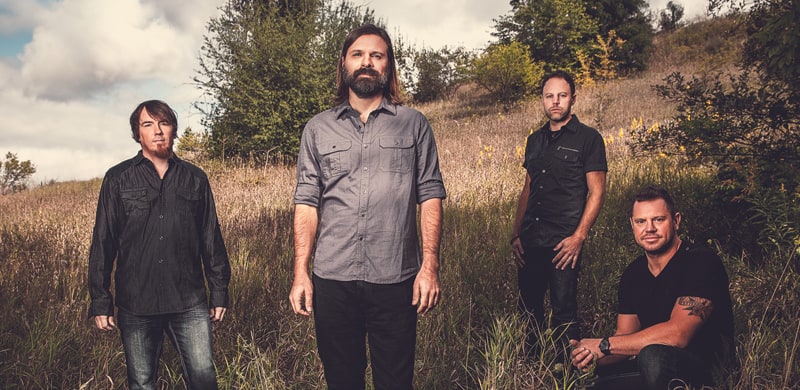
By Mark D. Geil
July, 2000. Billboard’s Christian Albums chart includes a double album with the strange title WOW Worship Orange. Title aside, the album went Platinum. It was the second in a series of compilations of worship music, and its track list tells a story about a pivotal time in Christian music.
Disc one opened with “Did you Feel The Mountains Tremble” by Delirious?, a thoroughly modern anthem replete with pounding drums, Stu G’s electric guitars and Martin Smith’s delightful accent. Disc two featured “As the Deer” performed by the Maranatha! Singers, a group that began in 1971 singing a breezy song containing the word panteth. Modern worship music was being defined, one song at a time.
That same month, a rock band named Third Day answered repeated calls from fans to capture on an album some of the worship songs they often included in their live sets. Offerings was released with fairly low expectations from the band itself, but it quickly became their first album certified Platinum. A follow-up was released three years later, but after that, the band stuck with their signature rock genre, until now. 2015’s Lead Us Back: Songs of Worship is a powerful new worship album consisting of all new studio material written around a theme of deliverance, paralleling the Exodus with our redemption through Christ. Given this unique history with worship music, Third Day’s Mac Powell has some perceptive insights on how things have changed over a decadeand-a-half.
“The Offerings records started as a side project for our fans,” Powell recalls. “When we were just starting as a band, we played a lot of churches and camps and, naturally, we did our own versions of a lot of worship songs. Friends started asking for a worship record, so we used some live stuff we’d recorded, and we took a week to record the rest.”
This side project just happened to arrive at a time when listeners were desperate for new voices in worship, and Third Day clearly filled that void. “Honestly,” Powell says now, “I was scared to put the record out because I didn’t want it to look like we were just following some sort of trend. Sonicflood was releasing a worship album, and that was a big deal — a rock band focused on worship. I’m sure there were others before Sonicflood, but you didn’t hear as much about them. Suddenly, it was almost like its own sub-genre. But, I thought, We’re not going to become a worship band, and not many people will hear our record anyway, so it will be fine.”
Obviously, plenty of people heard the record, and the concept of rock-bands-doingworship-albums has become almost standard. As a whole, the main differences that Powell identifies in the worship genre from 1999 until now are related to quantity. “I don’t know that it’s changed for better or for worse, but it’s increased a lot. I think that’s great,” he adds. But how has Third Day’s approach to worship music changed over that time? For one thing, this time around the band wrote to a very specific theme. “Most of these songs are based on the Exodus and the correlation between Moses and Jesus, and how they both led God’s people to the Promised Land. For Moses it was to an actual land, and for Jesus it’s to salvation and heaven. I think so often we think of the Old Testament as when God was mad, and the New Testament as [when] God loves us. There’s so much love in the Old Testament as well, of God reaching out to His people, chasing His people, and leading His people. It was great to stay in that thought process and those ideas for the album.”
One other difference is important. “For this record,” Powell notes, “we were a lot more focused on the church and on corporate worship. We want this to be a collection of songs that a group of people could easily hear and sing back.” With that motivation Powell touches on a challenge unique to worship music composition: How does one craft melodies, music and vocal arrangements that are simple enough to be used by the church but not so simple that the songs become bland and generic? It’s a tension that Third Day has had to deal with. At one point while recording Lead Us Back, Powell delivered a vocal line with his powerful, distinctive voice that might have been, well, difficult for you or me to replicate. The producer’s solution was to simplify the vocal until the song’s melody was established, then let Mac do his thing later in the song.
In some sense, though, the corporate nature of worship music comes quite naturally to Powell. “Honestly for me, even in our regular rock music, I’m a lot more focused on the audience than the art. The art is so important — don’t get me wrong. I’ve heard a lot of people say, ‘It’s not about the music; it’s about the message,’ and I say, ‘Yeah, but if the music isn’t any good, where’s the message?’ But musically, I’m a lot more focused on the people listening than I am about me being cool. Not that that’s right or wrong, that’s where I lean. For me to try to tweak something to make it more corporate is not a big deal; that’s how I would lean anyway.”
Through the long time span between worship albums, Powell notes one consistent thread: “Scripture leads me to worship. You can read a verse you’ve read a million times before, but whatever circumstances you’re in — maybe it’s how you’re feeling that day or how the sun is shining — there is some different perspective, and you read it differently. You get something new from it.” Given that endless supply of motivation, it’s likely Powell and his bandmates will tread into the genre again.
When speaking on this subject with a band like Third Day, it’s hard to resist one final question. Being a rock band, how do they feel about their best-selling album being a worship record? Powell is quick to reply: “Man, I don’t care! It surprised me early on, but it doesn’t surprise me anymore. I’m just glad we even have a best-selling album!”
For more information on Third Day and their new worship record, visit www.thirdday.com.
##
Mark D. Geil is a freelance Christian music writer and photographer. Mark has written bios for over 40 artists and industry leaders, and he’s a regular music critic and contributor for multiple media outlets. His work has appeared in CCM Magazine, ChristianityToday.com, Relevant, and more. Mark also has a Ph.D. in Biomedical Engineering and works by day as a professor at Georgia State University. He lives near Atlanta with his wife and three daughters. www.markdgeil.com




